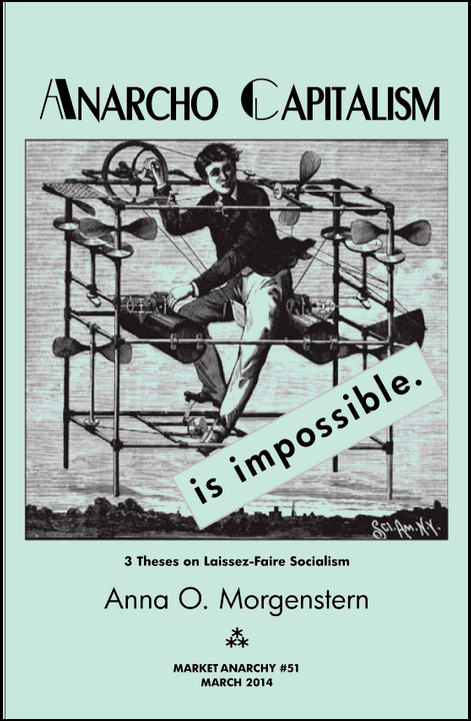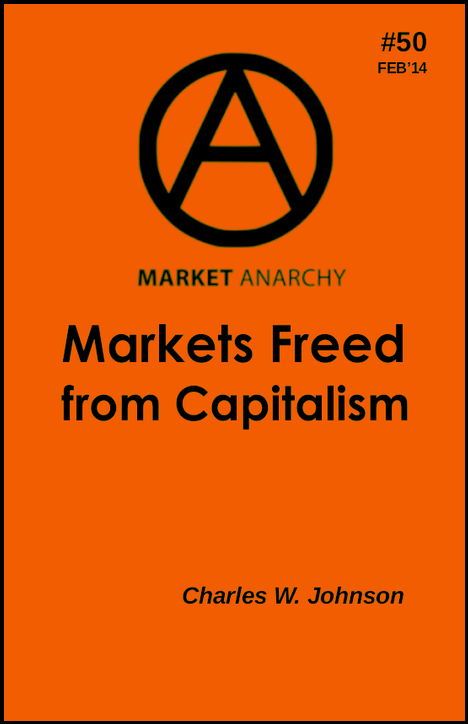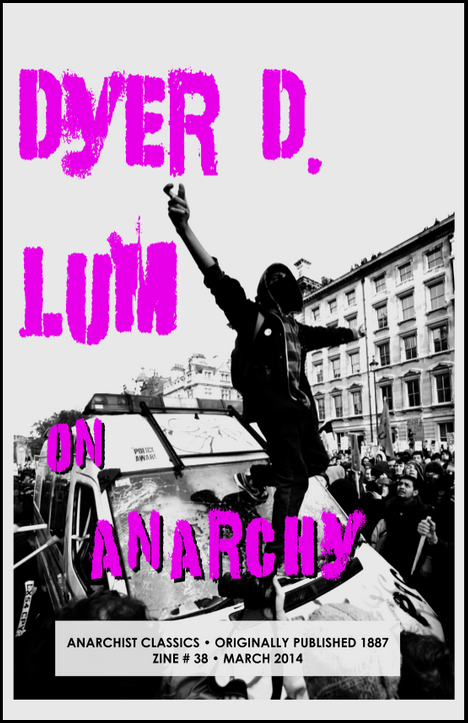May has been an interesting month for The Center for a Stateless Society (C4SS). We have added some new features and people to the roster and reached a couple of milestones in our development.
If you are a regular donor, then I would like to thank you for your continued enthusiasm and support. If you are interested in supporting our mission “to explain and defend the idea of vibrant social cooperation without aggression, oppression, or centralized authority” with a monthly $5 donation, then I would like to give you an idea of you can expect from C4SS.
Updated C4SS News Widget
NEW! Now in 100% pure javascript! One way you can support C4SS is by placing our news widget on your site. You can customize and create your own version of the C4SS News Widget. Kevin Carson and Mike Gogulski both have standard versions of the widget on their blogs, but they give you an idea of what it will look like on your sidebar.
For the month of May, C4SS published:
25 Commentaries (1 more than April),
14 original Features (4 more than April),
4 Weekly Abolitionists,
7 Life, Love and Liberty,
5 Weekly Libertarian Leftist Reviews,
3 Missing Commas,
3 Wars and Rumors of Wars,
3 Hardly Working,
1 original Book Review and
17 C4SS Media uploads to the C4SS youtube channel.
Thanks to the dedication of our Media Coordinators, C4SS translated and published:
9 Italian translations,
2 Spanish translations and
21 Portuguese translations.
For our supporters that have been following C4SS’s extension into South America, Brazilian interest and traffic has continued to best Canada and the United Kingdom combined.
New Features
C4SS has expanded your ability to support our work by joining the GITTIP network.
We have a new blog in our line-up: Nick Ford’s Hardly Working. Ford has been aggressively cataloging classics in the field “work refusal” and criticism of the “cultural of work” or “Puritan Work Ethic” on his site Abolish Work. Now he offers, for C4SS, a weekly to bi-monthly look into this area of criticism:
The goal of this blog is to promote a future where none of us will have to work. And by “work” I don’t mean just giving effort, but labor that we give to others under systematic duress. A good example is the workers who work in retail or low-paying jobs because they have no other good options.
The Students for a Stateless Society (S4SS) has release its second issue of The New Leveller.
“Are you interested in individualist anarchism, or at least so frightened by it that you want to keep an eye on its progress? Are you frustrated by capitalism’s love for central planning and communism’s conservative view of human potential? Do you suspect that abolishing the institution responsible for war, police brutality, and mass incarceration might not be so dangerous after all?
Then The New Leveller is for you!”
New People
C4SS has maintained a Panel of Advisers since mid-2009. Most of the original advisers have departed – leaving for other projects, differences of opinion or moving into other C4SS positions reflecting more responsibility. C4SS continues to grow and expand as an organization increasing a need for more points, or contributors, of information. To handle this organizational growth, we have begun to craft nested and semi-autonomous arrangements with S4SS, the C4SS Media Coordinators, sections of the Stigmergy Blog and the C4SS Media Project. As these projects come into their own, our primary project, “the production and distribution of market anarchist media content, both scholarly and popular” will require more eyes to make our bugs shallow. Our current advisers, Stephan Kinsella and Wendy McElroy, will now be aided by voices that have been either a part of the Alliance of the Libertarian Left discussion for almost a decade or individuals that have challenged us to consider new puzzles or stressed our current solution sets. It is in this spirit, calling our attention to new opportunities and talent as well as helping C4SS craft content and make decisions regarding direction and policy, that we are happy to introduce our new advisers:
Grant Mincy is C4SS’s expert on Appalachian activism and market/direct action based environmentalism. We are proud to announce that Mincy’s proposal for a new C4SS Study has been approved and funded. You can expect its publication within the next six to eight months. The study’s abstract and a sketch of its table of contents have been provided:
A Study Proposal for the Center for a Stateless Society
Coal, along with other fossil fuels, are the primary sources of energy for the United States. To date, fossil fuels provide 85% of the nations energy. Coal is the primary source of energy for the United States, providing over half of the electricity consumed by Americans. On a global scale, the United States has the largest known reserves of bituminous and anthracite coal. Much of the coal that is mined in the United States comes from the Appalachian Mountains. Coal mining in the region has created systemic poverty, untold amounts of human suffering and a precipitous decline in biodiversity in one of the worlds oldest temperate rain-forests.
I propose a study for C4SS that will focus on both the natural and social history of the Appalachian coalfields, followed by a market anarchist path to liberation. The study will be broken into three different parts, laid out as follows:
Preface:
- General introduction to the study and why I am conducting it.
- A Brief Analysis of Natural History:
- Geologic time and the rise of the Appalachians.
- Geologic time and the formation of coal.
- Geologic time and biodiversity.
- Exploitation of coal reserves and its impact on the environment (special regard to water quality and biodiversity).
Social History:
- Appalachian community life.
- Initial markets and way of life
- Appalachia and the British coal connection.
- Coal and capital.
- Coal and the state.
- The first coal barons.
- The rise of king coal and the community store.
- The rise of labor – United Mine Workers
- Systemic Poverty.
- From pit mining to mountaintop removal.
- Coals dominance of Appalachian landscapes and both the Appalachian and national economy.
Praxis:
- Social movements.
- “Paper wrenching”.
- Transition economics/Counter economics.
- Toward democratic energy.
- The stateless society.
Milestones In Our Development
Erick Vasconcelos has finally gotten a market anarchist commentary into The Fiji Times Online with his “Police Have Never Guaranteed Order.”
Kevin Carson’s “With ‘Socialists’ Like Lawrence and Wishart, Who Needs Capitalists?” was cited over all other possible commentaries in Ben Mauk, “Steal This E-Book?” blog post on The New Yorker. The Lawence and Wishart controversy also warranted a follow up – and left market anarchist situation summary – with Kevin Carson’s “Lawrence & Wishart: The Stone That The Builders Refused“.
The growing challenge of Uber and Lyft on walled gardens and state dependent models of agitation and organization prompted a series of articles that ran the spectrum of praise to guarded praise to calls for better modes of analysis for the situation and players involved:
Clark Ruper‘s “Between Radicalism & Revolution: The Cautionary Tale of Students For a Democratic Society,” over at The Students for Liberty blog kicked off an fruitful conversation regarding movement strategies, asking for greater perspective and refined goals in order to keep the tent of libertarianism big and the movement focused. Though we are sympathetic to the underlying motivations and Erasmian warnings against “enthusiasm”, we, ultimately, part ways in favor of a stigmergic and fractal libertarianism.
Cory Massimino and Joseph Diedrich concluded their Mutual Exchange “Private Property: How, When and Why” just in time for our newest Mutual Exchange over contested conceptions of privilege. This Mutual Exchange is, unfortunately, not in time to make Roderick T. Long‘s dead line for papers on the same topic: Libertarianism and Privilege. We hope that it will be a welcome parallel discussion with some cross-pollination. The opening article will be Casey Given’s, “What’s the Point of Checking Your Privilege?” with responses and critique from Nathan Goodman, Kevin Carson and Cathy Reisenwitz.
We still have, in the works, reviews from,
We have added to our list of book reviews:
Feed 44, the C4SS Media Project’s working name for our two podcast channels – itunes and sticher – has been performing better than expected. Trevor Hultner sent me this update on the projects progress:
For the month of May (one week left until bandwidth reset), C4SS Media podcasts were downloaded a grand total of 8089 times, or approximately 577 downloads per episode. For the first month of podcasting, I would say that “Feed 44,” the unofficial-official name of C4SS’s podcast channel, has been a smash success.
While the only content currently on Feed 44 are recordings of past C4SS articles, in June C4SS Media plans to introduce new, original content to the mix. We’d also like to officially welcome Max LaFave, Juliana Perciavalle, Christopher King and Jason Lee Byas to the roster of content creators and voice talents.
The C4SS Tor Node has successfully been transferred from Mike Gogulski, who is moving on to more interesting projects, to C4SS proper and paid up through July, 2014. You can check out the node’s status here: Tor Network Status — Router Detail. Expect a fundraiser soon to keep this project going, now on its third consecutive year. Find out how you can use Tor or set up your own Tor Node: “Tor: The Onion Router“.
Another milestone of humbling significance to our diligent social media coordinators is C4SS, finally, becoming Tumblr famous.
C4SS has been a long time partner with Charles Johnson‘s Alliance of the Libertarian Left Distro and would like to highlight the Distro‘s newest additions to its Market Anarchist and Classic Anarchist zine collections. For every zine that you purchase through the Distro, C4SS will receive a percentage. Another great way to support C4SS and brush up on some classic anarchism.
We Haven’t Forgotten
We still have our David Graeber Symposium on the horizon, along with our Carson-Ward-Bookchin edition of Kropotkin’s “Fields, Factories and Workshops Tomorrow”.
Please Support Today!
Needless to say, all of this work is only sustainable through your support. If you think the various political and economic debates around the world are enhanced by the addition ofleft libertarian market anarchist, freed market anti-capitalist or laissez faire socialist solutions, challenges, provocations or participation, please donate $5, today. Keep C4SS going and growing.
ALL the best!



 To head off such retreats, to keep the statists on the playing field, we must build a world of proactive, individual-scale connections. In the more trivial ad hoc limit this can look like peer-to-peer connections between the phones of passing strangers, but when it comes to building lasting resilient bonds there’s no replacing on the ground community organizing. The sort of projects anarchists have long taken the lead in, building one-on-one relationships of trust and strengthening the human roots upon which all other relations are built.
To head off such retreats, to keep the statists on the playing field, we must build a world of proactive, individual-scale connections. In the more trivial ad hoc limit this can look like peer-to-peer connections between the phones of passing strangers, but when it comes to building lasting resilient bonds there’s no replacing on the ground community organizing. The sort of projects anarchists have long taken the lead in, building one-on-one relationships of trust and strengthening the human roots upon which all other relations are built. There are many community mesh wifi projects with radical sensibilities, some like those of
There are many community mesh wifi projects with radical sensibilities, some like those of 









